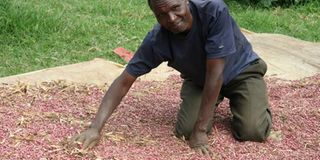Seed Trade Association wants ‘idle’ Agriculture Development Corporation land for research

A farmer dries his been seeds. FILE PHOTO |
What you need to know:
- Association secretary Dr Evans Sikinyi said due to seed shortage, the industry has, for a long time, which could be produced locally.
- The lucrative seed industry has continued to attract many players following the liberalisation of the sector.
The Seed Trade Association of Kenya (Stak) has urged the government to lease part of the idle Agriculture Development Corporation (ADC) land across the country to its members for the development of seed industry in a bid to improve crop production in the country.
Association secretary Dr Evans Sikinyi said the only way to overcome challenges of availability of seeds is to put infrastructure for seed production under irrigation.
“Most seed companies in Kenya depend on rain but since that has become unreliable, Stak is urging the government to lease land in ADC farms to be used for irrigation projects to develop the seed industry in Kenya,” Dr Sikinyi told the Sunday Nation.
“This will address the shortage of seed that has slowed down crop production.”
He said due to seed shortage, the industry has, for a long time, which could be produced locally.
BRIDGE DEFICIT
According to Stak’s 2012 statistics, the country produced 32 million kilograms of various types of seed, out of a minimum of 35 million required, and imported three million kilograms to bridge the deficit.
A large part of the country’s importation were vegetable seed as the country does not have the capacity to develop seed in the extreme cold temperature conditions experienced in Europe.
Seed companies produced 26 million kilograms of hybrid maize seed in 2012, and imported two million kilos.
The lucrative seed industry has continued to attract many players following the liberalisation of the sector, which has seen companies earn more than Sh5 billion from sale of seed to farmers annually.
The official noted that the government needs to allocate land for seed merchants in irrigation schemes such as Bura to develop various seed varieties.
He said already some Stak members have leased land in Ahero for to grow rice.
“Kenya is capable of producing high yielding seed varieties with the level of technological advancement available in Kenya. We can alleviate seed shortages and fight food insecurity,” said Dr Sikinyi.
At the same time Dr Sikinyi called on the government to abolish Value Added Tax on seed so that more farmers could access certified seed with ease.
“The high prices of seed have seen many farmers fall victim to unscrupulous merchants who sell uncertified seed, leading to perennial poor yields.”





